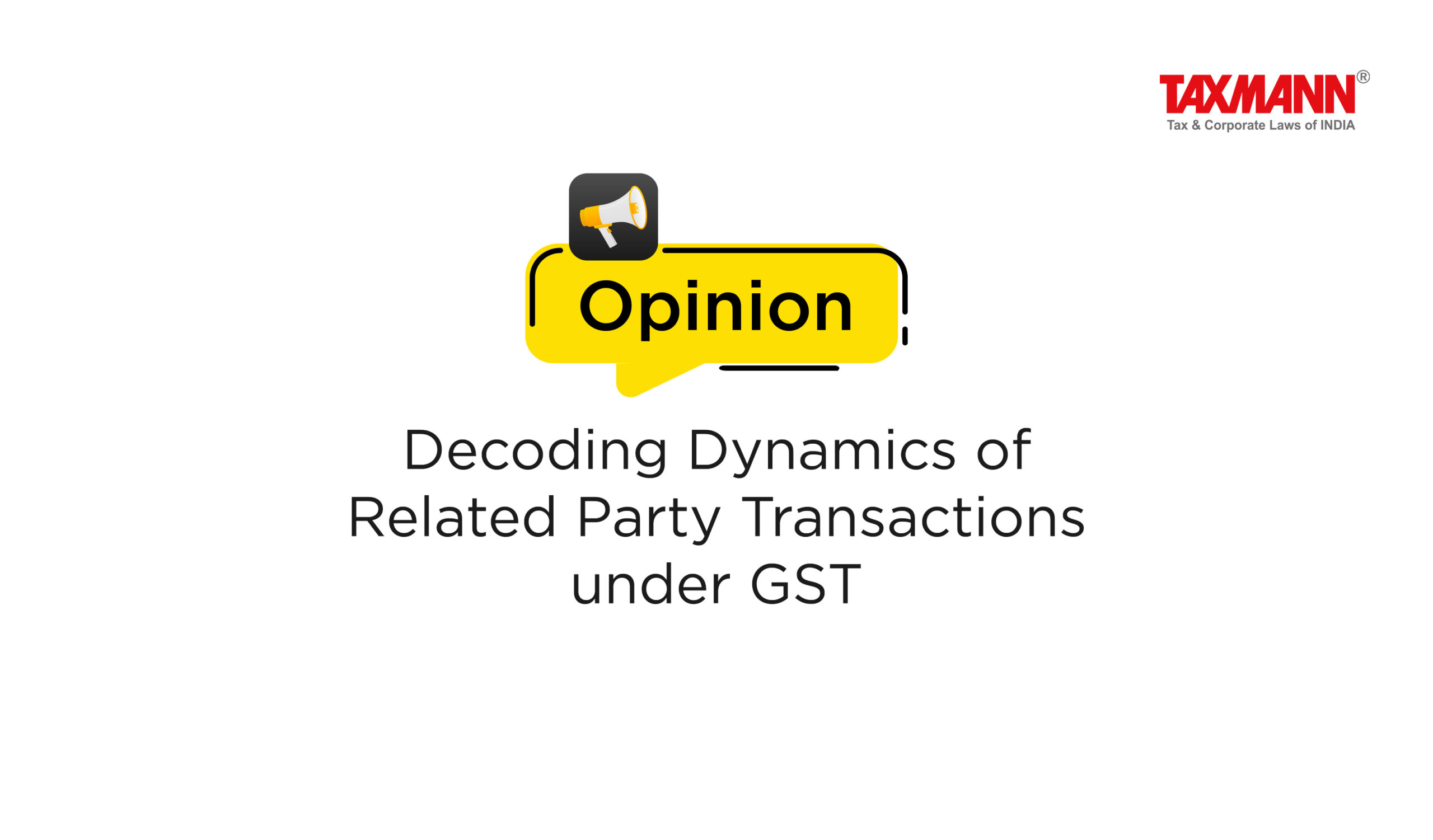[Opinion] Decoding Dynamics of Related Party Transactions under GST
- Blog|News|GST & Customs|
- 3 Min Read
- By Taxmann
- |
- Last Updated on 28 June, 2023

Dharnendra Kumar Rana, Shubham Agarwal & Ekum Singh Sethi – [2023] 151 taxmann.com 496 (Article)
You don’t pay taxes – they take taxes – By Chris Rock
Apropos Indian context, statistics indicate that predominantly, enterprises are family-controlled with a web of interlinked entities, they contribute to substantial portion of our economy. Unlike transactions with third parties, distinguishing factor of Related Party Transactions (‘RPT’) is the special relationship between the transacting parties, which if misused, can lead to grave consequences like misreporting, favorable treatment, twisted valuation or loss of tax collection to exchequer. In RPT, transacting parties hold substantial degree to mutual interest, to bend the transaction in their favor. Due to this reason RPT has always been specially dealt under all laws globally and GST law is not an exception.
In this article, Authors have delved into RPT from GST perspective and have attempted to highlighted related key challenges.
Definition and scope of coverage of ‘related party’ under GST law is very wide. As a general rule, transaction value between unrelated parties is accepted as value of supply. GST being a creditable tax in most of the transactions, it would not pose any loss to exchequer, inspite of distorted valuation, if full Input Tax Credit (‘ITC’) is available to the recipient related party. Therefore, Second Proviso to Rule 28 provides accepts valuation adopted by the supplier where full ITC is available to the recipient related party.
However, adoption of any value for RPT under Rule 28 is not free from dispute from tax authorities. Even after various favorable orders from AAAR and AAR revenue authorities insist on applying Open Market Value (‘OMV’) instead of Second Proviso to Rule 28.
Applicability of Rule 28 is further prone to challenge by tax authorities. It allows discretionary valuation where full ITC is available to the recipient related party. There seems to be lack of clarity regarding ambit of Rule 28, whether it warrants a wider interpretation, or a transaction wise approach qua eligibility of full ITC to the recipient.
Applicability of this Rule becomes fuzzy, where recipient is having exempt supplies to some extent and services supplied by related party are common services. The supplies made by supplier related party might be put to use by the recipient related party either in further taxable supplies or in exempt supplies. The ultimate use of supplies by recipient related party in taxable or exempt supplies may not be known to the supplier related party at the time of making supplies. In such a scenario, it poses a dilemma for the supplier related party as to whether it can adopt any value for the supplies, or it should make supplies at OMV. It is impossible for a supplier to upfront determine eligibility of full ITC to the recipient where supplies are common as recipient can make exempt supplies in later period also.
Industry is heavily relying on this Rule for valuing RPT like cross charge, which would mostly qualify as common services for the recipient. As evident, valuation of RPT is not as straight as it seems. This issue will sooner or later knock the door of the Courts.
In Author’s view, if an interpretation is adopted to consider ITC availability not on transaction basis but for the recipient as a whole, then it can lead to making this proviso redundant, which cannot be the intent of legislature. Therefore, condition of eligibility of full ITC to recipient shall be seen transaction wise.
Click Here To Read The Full Article
Disclaimer: The content/information published on the website is only for general information of the user and shall not be construed as legal advice. While the Taxmann has exercised reasonable efforts to ensure the veracity of information/content published, Taxmann shall be under no liability in any manner whatsoever for incorrect information, if any.

Taxmann Publications has a dedicated in-house Research & Editorial Team. This team consists of a team of Chartered Accountants, Company Secretaries, and Lawyers. This team works under the guidance and supervision of editor-in-chief Mr Rakesh Bhargava.
The Research and Editorial Team is responsible for developing reliable and accurate content for the readers. The team follows the six-sigma approach to achieve the benchmark of zero error in its publications and research platforms. The team ensures that the following publication guidelines are thoroughly followed while developing the content:
- The statutory material is obtained only from the authorized and reliable sources
- All the latest developments in the judicial and legislative fields are covered
- Prepare the analytical write-ups on current, controversial, and important issues to help the readers to understand the concept and its implications
- Every content published by Taxmann is complete, accurate and lucid
- All evidence-based statements are supported with proper reference to Section, Circular No., Notification No. or citations
- The golden rules of grammar, style and consistency are thoroughly followed
- Font and size that’s easy to read and remain consistent across all imprint and digital publications are applied



 CA | CS | CMA
CA | CS | CMA
